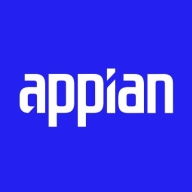

Appian and Bizagi are leading in the business process management category. Appian holds an edge with its robust low-code features and efficient integration abilities, while Bizagi shines in intuitive process modeling and compliance with BPMN 2.0 standards.
Features: Appian offers robust low-code features that enhance rapid application development, efficient process and case management, and excellent integration abilities. It regularly updates to cater to various business needs, improving its offering progressively. Bizagi is celebrated for intuitive process modeling and automation capabilities, along with compliance with BPMN 2.0 standards. Its accessible integration and simulation capabilities make it user-friendly for those with minimal technical expertise.
Room for Improvement: Appian's challenges include flexibility in user interface customization, mobility features, and improved DevOps integration. Users also call for enhanced offline capabilities and better analytics. Bizagi requires performance improvements with large processes and stability in new features. The free version lacks some advanced functionalities, and the interface could benefit from modern enhancements.
Ease of Deployment and Customer Service: Appian supports public, private, and hybrid cloud environments with excellent customer service, though faster responsiveness will boost its support reputation. Bizagi's on-premises deployment may limit clients preferring cloud solutions, and while its customer service is effective, it is considered average compared to Appian.
Pricing and ROI: Appian's higher pricing is countered by its flexible model, yielding a significant ROI through rapid development and time-to-market efficiencies. Bizagi appeals to budget-conscious organizations with lower pricing, providing substantial functionality for process modeling at lower costs. While Appian generally delivers better ROI through efficiencies, Bizagi is favored for cost savings in less complex environments.
Using Appian is saving us five full-time employees, which is significant since we currently have only four team members.
They see return on investment in terms of cost savings, time savings, more efficient processes, and more efficient employees.
The Return on Investment is significant.
I would give Appian's customer support 10 out of 10 due to their next-level support.
Their customer service is responsive, and the team is very prompt for support.
The technical support for Appian rates as 10 out of 10 because they have a great support team.
It is a community product, there is not much support we can expect.
The toolset is very intuitive, so we didn’t need to contact their support much.
On a scale of one to 10, Appian rates as a nine for scalability.
Our volume has increased by 20% in the two years since using Appian, and it can handle the increased volume effectively.
Initially, without much coding, I can easily handle five thousand records.
There is no direct scalability option.
If I rate scalability from one to ten, I would probably give it a six.
We have tested Appian during peak usage and off-peak times, and we have not experienced any issues such as lagging or system disruptions.
It depends on how it has been designed and how it has been configured.
The stability of Appian would rate as nine, as it's a stable environment.
It has room to improve for use cases where the users are public facing, where anonymous users could come to a site and run a business workflow or interact with some data.
Appian can be improved by adding a geo-location tagging feature, which would be really helpful for identifying remitter addresses.
It also suggests the best automation process that can be configured within Appian.
Reporting capabilities can be improved more, and community support should be increased.
For more mature environments, the integration to live systems is lacking, which affects its applicability.
The decision map could be improved to allow more than three options at a decision point.
Appian provides value for money, is easy to use, has a straightforward setup procedure, and offers great support from the Appian team.
On the pricier side, both Appian and Pega are enterprise-level solutions, placing them on the slightly higher side.
The pricing of Appian is based on the number of users and generally ranges from 70 to 100 USD per user per month.
Bizagi's pricing is very aggressive, and it was one of the reasons we chose it.
The zero-code integration feature is remarkable, allowing for ease of data transfer and workflow enhancement.
Appian is aiding in leveraging AI technologies in multiple ways: one way is for developers, as they make development efficient and quick by enabling developer co-pilots across various phases of the application, which helps design Appian quickly and provides suggestions along the way.
After switching to Appian, it can extract data from MT103, eliminating the need for manual data entry.
It is open source.
The user interface is very good, making it easy for business people to understand.
Bizagi has rich functionalities; compared to other BPMN tools, it has more features.
| Product | Market Share (%) |
|---|---|
| Appian | 4.5% |
| Bizagi | 4.3% |
| Other | 91.2% |

| Company Size | Count |
|---|---|
| Small Business | 20 |
| Midsize Enterprise | 9 |
| Large Enterprise | 43 |
| Company Size | Count |
|---|---|
| Small Business | 42 |
| Midsize Enterprise | 16 |
| Large Enterprise | 36 |
Appian is a unified low-code platform and solution used by businesses to build enterprise applications and workflows. This product adapts to the needs of clients and the technologies they are already using to combine their data in a single workflow and maximize resources. The platform has four main components through which it transforms the work process for companies of various sizes. They are:
Appian is utilized across a diverse set of industries, including automotive and manufacturing, energy and utilities, education, financial services, telecom and media, transportation, retail, insurance, healthcare, and life sciences. The most frequent use cases of Appian are customer journey, governance, risk and compliance, operational efficiency, supply chain, distributed order management, and environmental, social, and governance (ESG) management.
Appian Features
Appian has various features that allow users to create solutions for their businesses. These features can be separated into a few groups according to function, including automation, low-code application development, and integrations and data. Some of the most frequently used features of Appian include:
Appian Benefits
The benefits of using Appian include:
Reviews from Real Users
A practice leader - digital process automation at a computer software company values Appian highly because the product is easy to develop, low-code, and has a good user interface.
Alan G., an advisory board member at Codecon VR, Appian offers a clear application life cycle, easy to learn documentation, and comes with a fundamentals course.
Bizagi’s industry-leading low-code process automation platform connects people, applications, robots, and information. As the most business-friendly and flexible solution on the market, Bizagi enables true collaboration between business and IT, delivering faster adoption and success. Fuelled by a community of 1 million users, Bizagi powers over 1,000 organizations worldwide including Adidas, BAE Systems, and Old Mutual. For more information visit www.bizagi.com
We monitor all Process Automation reviews to prevent fraudulent reviews and keep review quality high. We do not post reviews by company employees or direct competitors. We validate each review for authenticity via cross-reference with LinkedIn, and personal follow-up with the reviewer when necessary.